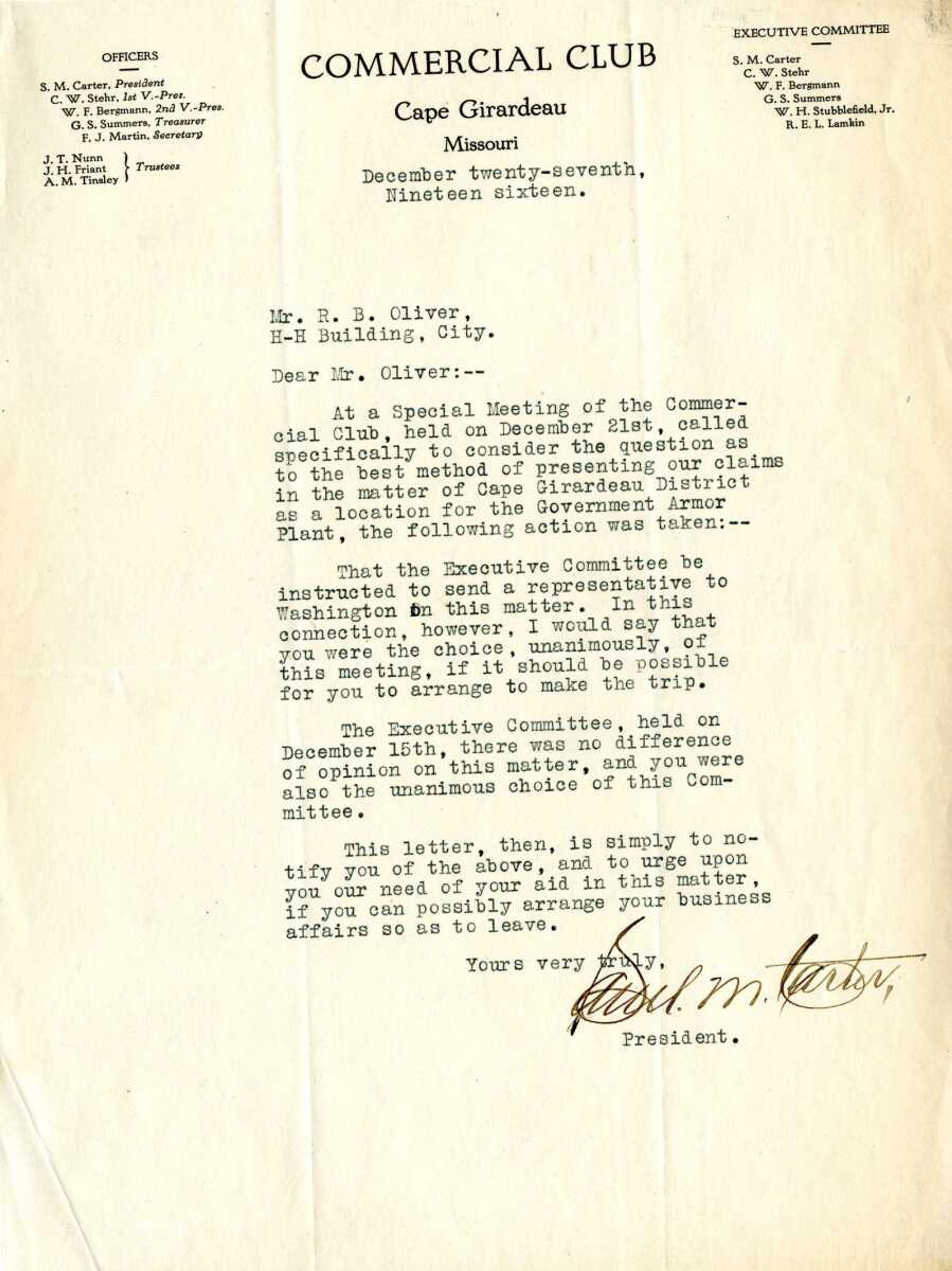Cape Girardeau's World War I bid for a U.S. Navy armor plant
On Aug. 29, 1916, the United States Congress assigned a committee of three -- Adm. Frank F. Fletcher, Cmdr. Frank Clark and Naval Engineer R.E. Bakenhus -- to select a location for a new U.S. Navy armory plant to produce steel for their vessels. Several Missouri cities submitted bids for the location including Hannibal, Louisiana and Cape Girardeau. Numerous other cities in the surrounding states also submitted bids, including Indiana, Illinois, Kentucky and Tennessee...
On Aug. 29, 1916, the United States Congress assigned a committee of three -- Adm. Frank F. Fletcher, Cmdr. Frank Clark and Naval Engineer R.E. Bakenhus -- to select a location for a new U.S. Navy armory plant to produce steel for their vessels. Several Missouri cities submitted bids for the location including Hannibal, Louisiana and Cape Girardeau. Numerous other cities in the surrounding states also submitted bids, including Indiana, Illinois, Kentucky and Tennessee.
The Commercial Club of Cape Girardeau spearheaded the effort to have the plant in this area. In its brief, the club highlighted the city's primary location, next to the Mississippi River, accessible railroads and mineral deposits available with iron, manganese iron ore, lead, zinc, nickel, cobalt and copper.
To present their case in Washington, D.C., the executive committee of the club unanimously selected local attorney Robert Burett Oliver Sr. to represent the city's interests. He arrived in our nation's capital on Jan. 5, 1917, and immediately went to work. He gathered Speaker of the House James B. "Champ" Clark, Rep. Joseph J. Russell, Sen. William J. Stone, Dorsey W. Shackleford and others at 10 a.m. before the full Locating Board at the Navy building the following day. Sen. Stone introduced Oliver to the board. In a letter to Merit E. Leming Sr., president of the Commercial Club, on Jan. 16, he told him he urged the members of the board "to make a personal inspection of the cities of our state seeking the location." Oliver writes further that none of what he got accomplished in less than 24 hours would not have been accomplished if it were not for Rep. Russell. He single-handedly got Oliver a meeting with the board to directly speak to them, plus allowed the use of his personal car for the Missouri delegation. He also provided direct access to meet directly with Sen. Stone and Speaker Clark.
Even though Oliver felt that the meeting was a success, he cautioned Leming that the board might not travel to Cape Girardeau, and that the city may not be selected for the plant. However, "...the club has acquitted itself with great credit in its presentation of this city's advantages for a manufacturing point as well as a residential city in which to live..."
On March 12, 1917, the St. Louis Post-Dispatch reported that the board visited sites in St. Louis and heard from several Missouri city delegations on the benefits of locating the plant in Missouri. According to an article on March 9, 1917, in the Cape Girardeau Daily Republican, Cmdr. Clark visited Cape Girardeau and surrounding areas to tour potential sites in the city, including the old smelter plant where Portland Cement used to be and land north of Thebes bridge.
The committee ultimately selected Charleston, West Virginia, as the site for the new armor plant. Ground was broken by Secretary of the Navy Josephus Daniels on Aug. 30, 1917.
Connect with the Southeast Missourian Newsroom:
For corrections to this story or other insights for the editor, click here. To submit a letter to the editor, click here. To learn about the Southeast Missourian’s AI Policy, click here.










